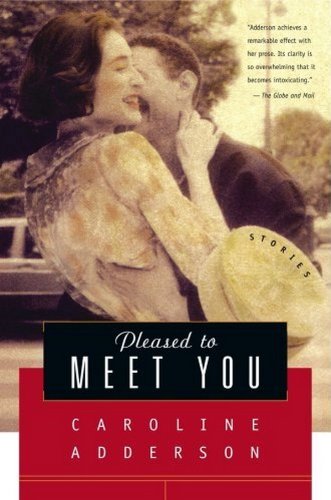About the Author:
Caroline Adderson is the author of two internationally published novels, "A History of Forgetting" and "Sitting Practice", and a widely anthologized previous collection of stories "Bad Imaginings". Her work has won her two Ethel Wilson Fiction Prizes, three CBC Literary Awards as well as numerous nominations including the Governor General’s Literary Award, the Rogers Trust Fiction Prize and the Commonwealth Writers’ Prize. London’s Independent on Sunday described her writing as “elegant, snappy, beautifully crafted.” In addition to fiction, Adderson has written for film and CBC radio. She lives in Vancouver.
Review:
THE SHORT STORY Close to poetry in its love of language RUSSELL SMITH The Globe & Mail June 12, 2008 Reading Caroline Adderson's prose after wading through the leaden, child-pleasing stories of our prize-winners (not mentioning any [Vincent Lam] names) is like being let through the door from the grey Ikea-furnished nursery into a sunlit garden full of adults. One lets out a happy sigh, loosens one's tie and accepts an intriguing and unusual drink. I could stay in her world all weekend. In fact, I just did. Adderson, a novelist and storyist from Vancouver, has just published a collection of stories called Pleased to Meet You, and it is my favourite book of the year so far; my favourite Canadian book of the past five. Her language is so textured it's almost - almost, but not quite - difficult; reading a paragraph of hers is a pleasure not unlike playing with some flashing video game. It's absorbing and delightful. I laughed out loud on several occasions and cried once. (The crying one was weird: not at the sad single-mom story, nor at the sad bullied-guy story, nor at the mean dad story, but at the title story, the one story with the hint, just the future possibility, of a happy ending.) Each of these stories begins as a puzzle, a mystery. ("First the pentagram. It preoccupies Inge all day," begins one.) There are strange characters in the middle of some complicated situation and it takes you a few pages to deduce exactly what and where. Writing manuals often teach the idea of change as the guiding arc in any narrative: A character must have a change of fortune, a change of heart, learn something; that's how you end. But not all of these conclude with a change or an epiphany. Their payoffs are really the reader's realization of what is going on and has been going on; they don't have plots so much as a falling-into-place. In this sense, they fall into the minimalist tradition of so much recent fiction: They are short, unexplained slices of interesting people's complicated lives. In content, perhaps, yes, but in style, they are hardly minimalist. "On the ceiling the smoke detector pants, open-mouthed. Black wire tongue, red wire tongue." This is a fiction of startling images made by metaphors and insights, as dense as poetry: "... the condominium across the alley entirely swathed in blue plastic. Three years ago our own building wore this same costume. Entire Vancouver neighbourhoods have. Ours is a city dreamed by Christo." Who but a genius would see a cat litter box and describe it brimming with "abstract figurines of desiccated shit"? Abstract figurines! It's not surprising that our most talented writers are still working in this famously Canadian-dominated genre. What is surprising is that their publishers and agents, and possibly their families, try as hard as they can to dissuade them from it. Well, it's not that surprising: Short-story collections don't sell very well. People want novels. Actually, they don't even want novels, they want biography and self-help. Actually, they don't want books at all, they want reality TV shows about losing weight - but okay, of those who do want to read books, and of that small number those who want to read fiction, most want novels. This year, a couple of large publishers have been brave and put some marketing vim behind hardcover story collections - Craig Boyko's Blackouts, from McClelland & Stewart, and Anthony De Sa's Barnacle Love, from Doubleday, for example. This may be, in part, due to Vincent Lam's having won the big shebang with a story collection two years ago; so there may be some good effects from the Giller Prize after all. Why do people find stories more difficult? Adderson answered this question herself, to some public consternation, at a couple of appearances at the Luminato Festival currently going on in Toronto. At a panel discussion in a public library, she said she thought that the pleasure of the short story did not lie so much in its story as in its language. This caused some raised voices in the question-and-answer period. In a second discussion, she expanded on this: The short story, she said, was closer to the poem; the novel was closer to drama (plays and films). Certainly this is true of the contemporary literary story, which at its best is more of a polished and prismatic gem than a parable. It's natural that this stymies some readers reared on O. Henry and Edgar Allan Poe who expect stories to have a surprising yet satisfying twist as their dénouement. It's hard to come to a narrative form, so used as we are to the climactic scenes of long narratives, without much expectation of a resolution, much less a moral lesson. Adderson even admitted that when she creates her narratives she is more guided by the explosions of language in her brain than by any preconceived story: The language that comes to her will actually lead the story. This might explain more than anything why short stories seem more difficult than novels, and also why they are, like poetry, where the unexpected and unformulaic tend to happen. (Russell Smith, Globe & Mail)
"About this title" may belong to another edition of this title.


